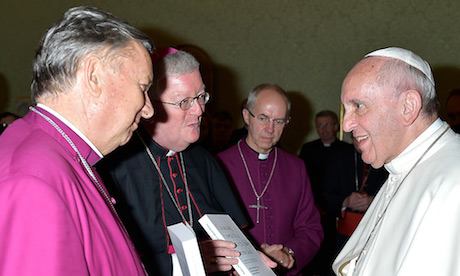A new document reflects a fresh approach taken by the official Anglican-Roman Catholic dialogue commission.
It shows a major development in ecumenism by establishing that difference is not cause for suspicion or reproach but is rather an opportunity for mutual listening, learning and conversion.
The statement, Walking Together on the Way: Learning to Be the Church — Local, Regional, Universal, was released to the public July 2 after seven years of joint meetings and consultations.
In their introduction co-chairmen, Catholic archbishop Bernard Longley and Anglican archbishop Sir David Moxon wrote that the document sought to develop the issues of authority and ecclesial communion “in a new way.”
Moxon, who is a New Zealander, was the Archbishop of Canterbury’s representative in Rome from December 2012 until June 2017, when he retired and returned to New Zealand.
He had previously been the Bishop of Waikato in the Diocese of Waikato and Taranaki, the archbishop of the New Zealand dioceses and one of the three primates of the Anglican Church in Aotearoa, New Zealand and Polynesia.
The document proposes that the understanding how the Catholic Church and the Anglican Communion structure authority and exercise authority in communion on the local, regional and global levels are key for understanding how each body discerns its teaching and practices on critical issues in ethics and moral theology.
It says this is also key for understanding and addressing questions, debates or divisions experienced internally within the churches.
This means the document also seeks to inform, enrich and help not just the Catholic Church and the Anglican Communion on an ecumenical level, but also in dealing with their own internal debates and tensions.
Catholics can learn from Anglicans in giving a greater role to the laity in matters of church governance and more authority to local bishops’ conferences.
Anglicans should focus on setting up structures and processes that safeguard the worldwide identity of its Communion and avoid becoming too focused on one province.
Source
